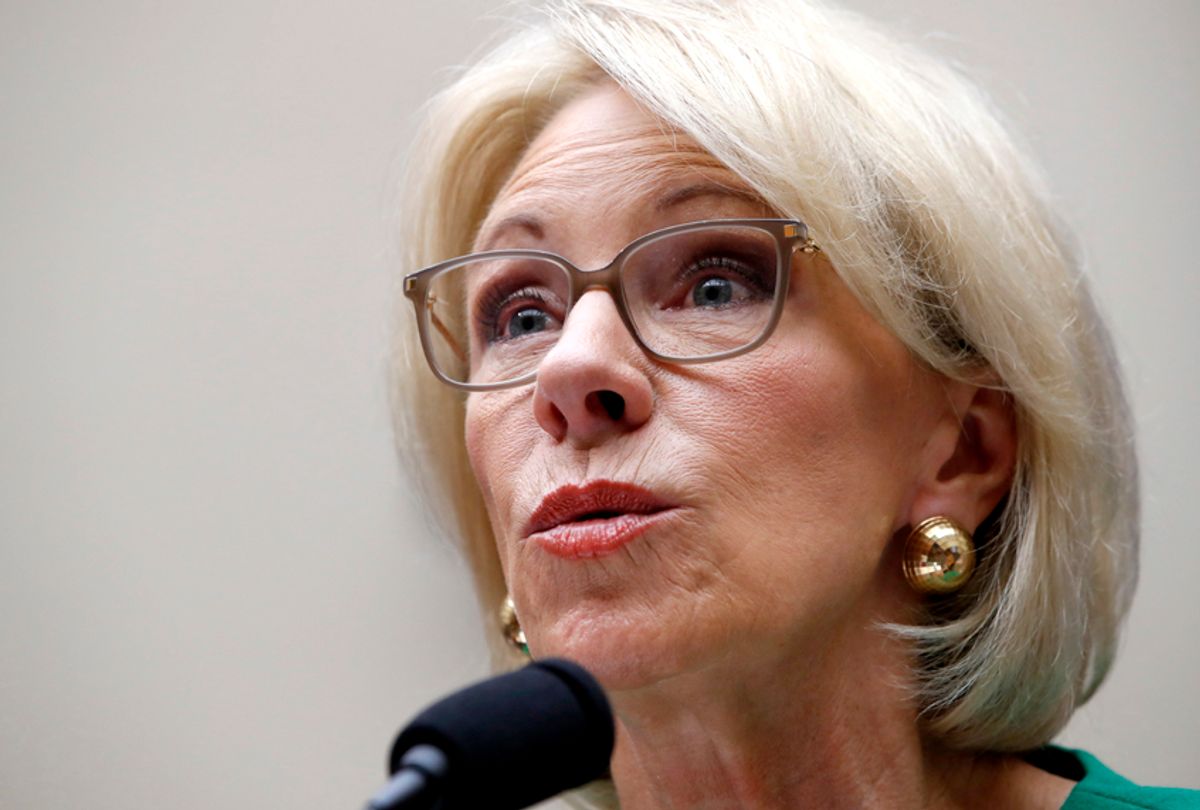Education Secretary Betsy DeVos announced Monday she will allow religious groups to provide taxpayer-funded services in private schools, in a move education advocates called an affront to the separation of church and state.
Under federal law, private schools are granted “equitable-services provisions,” which entitle private schools to taxpayer-funded services provided to public schools, The Washington Post reported. The rules allow public school funds to go toward training private school teachers or even helping to staff classes. But the rules bar private schools from contracting religious groups for these purposes.
DeVos announced Monday that she will no longer enforce a rule prohibiting religious institutions from providing these taxpayer-funded services in private schools, claiming that the restriction runs counter to a recent Supreme Court decision that said “otherwise eligible recipients cannot be disqualified from a public benefit solely because of their religious character.”
DeVos cited the court’s ruling in favor of Missouri’s Trinity Lutheran Church, which ruled that the state discriminated against the church by denying a church-run preschool taxpayer-funded tire scraps for its playground, and claimed the ruling allowed religious groups to receive taxpayer funds as long as the services it provides to the school are secular.
“The Trinity Lutheran decision reaffirmed the long-understood intent of the First Amendment to not restrict the free exercise of religion,” DeVos said in a statement. “Those seeking to provide high-quality educational services to students and teachers should not be discriminated against simply based on the religious character of their organization.”
The department said that the services must be “secular, neutral and non-ideological.”
Democrats say they will review whether DeVos’ move is constitutional.
“House Democrats are carefully reviewing the legality of the administration’s new policy,” Education and Labor Committee spokesman Joshua Weisz told the Post.
Andy Smarick, the former president of the Maryland State Board of Education, told the outlet that the move will certainly be met with legal challenges.
“It’s either courageous or provocative, depending on how you look at it. It calls into question if this part of the federal law is still valid,” Smarick said, adding, “This is the kind of decision that would have had to go through lawyers, policy debates; it’s a major decision. This kind of move doesn’t happen lightly in most administrations.”
Advocacy groups like Americans United for Separation of Church and State argue that DeVos overstepped her constitutional authority with her decision.
“Betsy DeVos is neither the Supreme Court nor Congress. She does not get to unilaterally declare that a statute is unconstitutional, especially with a provision that is designed to protect church-state separation, a bedrock of our democracy,” Maggie Garrett, the group’s vice president for public policy, told the Post.
DeVos’ announcement follows a similar move last year when the department said it would roll back restrictions on religious colleges following the Trinity Lutheran decision. DeVos said at the time that she expected the decision to invalidate state restrictions on taxpayer funding being given to religious groups that provide a public service, The New York Times reported.
The Trump administration, and DeVos in particular, have ignored discrimination against students of color, women and the LGBTQ community but has made it a priority to fight “religious discrimination.”
Shortly after Trump took office, then-Attorney General Jeff Sessions issued an order to all agency heads that laws “must not discriminate against religious organizations in their contracting or grant-making activities.”
“Except in the narrowest circumstances, no one should be forced to choose between living out his or her faith and complying with the law,” Sessions said in the guidance. “Therefore, to the greatest extent practicable and permitted by law, religious observance and practice should be reasonably accommodated in all government activity, including employment, contracting and programming.”



Shares